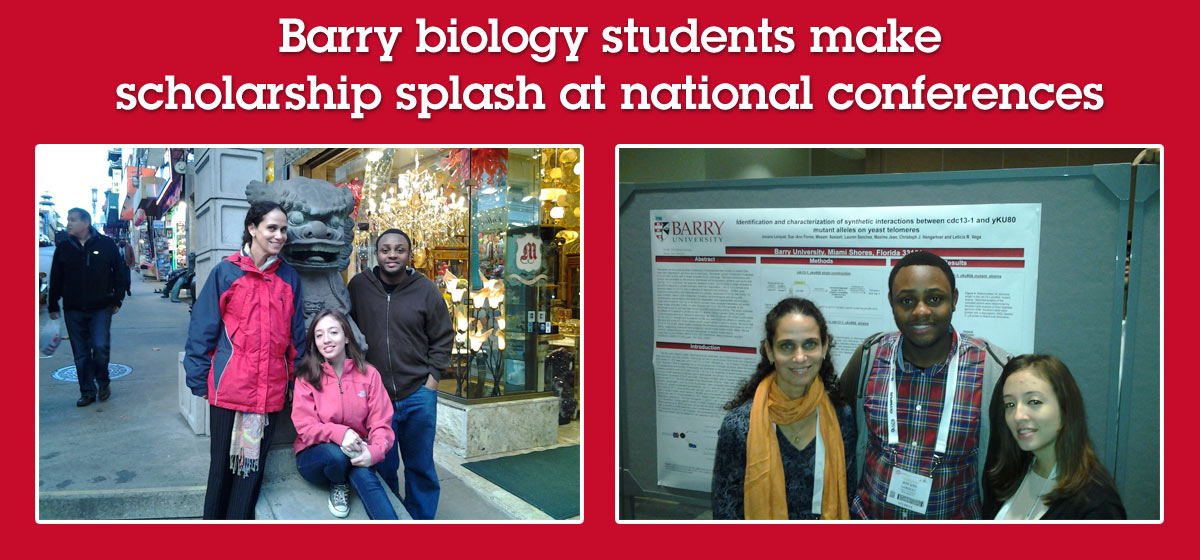During the 2012-2013 academic year, Barry University biology students put their scholarship skills on national display while presenting their research to biology scholars, scientists and students across the country.
In November, Barry biology students Precious De Verteuil, Nicole Lopez and Talia Guardia traveled to San Jose, Calif., to present at the Annual Biomedical Research Conference for Minority Students – the largest, professional conference for minority students pursuing advance training in science, technology, engineering and mathematics (STEM). During the conference, more than 1,500 students participate in poster and oral presentations in 12 disciplines in the biomedical and behavioral sciences, including mathematics.
“I was excited to present at ABRCMS, because it was the biggest conference I had ever attended,” said Lopez, a senior in Barry’s Minority Access to Research Careers (MARC) U*STAR Program. “It was truly a great experience to be able to interact with people from all around the nation who are pursuing the same dreams that I am.”
In December, Barry biology students set out for another West Coast conference – the annual meeting of The American Society for Cell Biology in San Francisco.
“It was a valuable experience because not only did I present my findings, but I also had the opportunity to network with many great scientists and researchers and to see the new research tools in the market,” said Daphne Petit-Homme, a senior in Barry’s Biology (BS) Pre-Professional program.
Jovans Lorquet, a junior in Barry’s Biology (BS) Pre-Professional program, funded by NIH-sponsored Research Initiative for Scientific Enhancement (RISE) Program, also presented at the ASCB conference with Barry Physical Sciences student Sue Ann Flores and Barry Associate Professor of Biology Dr. Leticia Vega. Their paper “Identification and characterization of synthetic interactions between cdc13-1 and yKU80 mutant alleles on yeast telomeres” was awarded second place in the undergraduate poster presentation.
“I gained more experience when it comes for me to present in the future, and I have also learned many new concepts from looking at other people’s posters and also from going to the talks during the meeting,” Lorquet said.
In February, Barry biology and MARC U*STAR alumnus Alec Davila represented Barry on the East Coast at the American Association for the Advancement of Science in Boston.
“Throughout the day, I learned a vast amount of information about other research projects, which was helpful to my recent studies at Barry,” Davila said. “Being able to correlate other research projects to my own brought about new ideas, which helped further advance my project.”
Faculty of Barry’s biology program play a hands-on role in helping Barry students learn the research process, said Laura Mudd, Ph.D., professor and chair of Barry’s undergraduate biology program. Faculty work with students on developing methods to answer scientific questions; developing protocols; showing them how to use equipment; ensuring that experiments are properly controlled and that proper safety precautions are taken; ensuring that research is in compliance with federal environmental laws; and helping students prepare posters and practice oral presentations of their work for conferences.
“Barry’s biology department prepared me to the greatest of its ability to allow me to choose a career as a physician-scientist,” Davila said. “Obtaining my bachelor’s degree in biology was no easy task, but the mentorship and support I received throughout my years was astonishing. My experiences at Barry have strengthened my appreciation of science and have allowed me to become a stronger individual.”
For more information about Barry’s undergraduate biology program, visit https://www.barry.edu/biology/

